
Helene Bertha Amalie "Leni" Riefenstahl was a German film director, photographer and actress known for her role in producing Nazi propaganda.

Triumph of the Will is a 1935 German Nazi propaganda film directed, produced, edited and co-written by Leni Riefenstahl. Adolf Hitler commissioned the film and served as an unofficial executive producer; his name appears in the opening titles. It chronicles the 1934 Nazi Party Congress in Nuremberg, which was attended by more than 700,000 Nazi supporters. The film contains excerpts of speeches given by Nazi leaders at the Congress, including Hitler, Rudolf Hess and Julius Streicher, interspersed with footage of massed Sturmabteilung (SA) and Schutzstaffel (SS) troops and public reaction. Its overriding theme is the return of Germany as a great power with Hitler as its leader. The film was produced after the Night of the Long Knives and many formerly prominent SA members are absent.

The Nuremberg Rallies refer to a series of celebratory events coordinated by the Nazi Party in Germany. The first rally held took place in 1923. This rally was not particularly large or impactful; however, as the party grew in size, the rallies became more elaborate and featured larger crowds. They played a seminal role in Nazi propaganda events, conveying a unified and strong Germany under Nazi control. The rallies became a national event once Adolf Hitler rose to power in 1933, when they became annual occurrences. Once the Nazi dictatorship was firmly established, the party's propagandists began filming them for a national and international audience. Nazi filmmaker Leni Riefenstahl produced some of her best known work including Triumph of the Will (1934) and The Victory of Faith (1933), both filmed at the Nazi party rally grounds near Nuremberg. The party's 1938 Nuremberg rally celebrated the Anschluss that occurred earlier that year. The 1939 scheduled rally never came to pass and the Nazi regime never held another one as both the government and Nazi Party prioritized Germany's effort in the Second World War over everything else.

Béla Balázs, born Herbert Béla Bauer, was a Hungarian film critic, aesthetician, writer and poet of Jewish heritage. He was a proponent of formalist film theory.
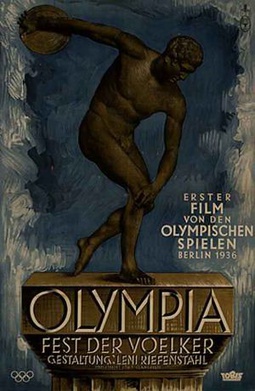
Olympia is a 1938 German sports film written, directed and produced by Leni Riefenstahl, which documented the 1936 Summer Olympics, held in the Olympic Stadium in Berlin during the Nazi period. The film was released in two parts: Olympia 1. Teil — Fest der Völker and Olympia 2. Teil — Fest der Schönheit. The first documentary about the Olympics made, Olympia set the precedent for future cinematic documents, glorifying the Olympics, particularly the Summer Games. The 1936 Summer Olympics torch relay was devised for the Games by the secretary general of the Organizing Committee, Dr. Carl Diem. Riefenstahl staged the torch relay for the film, with competitive events of the Games.
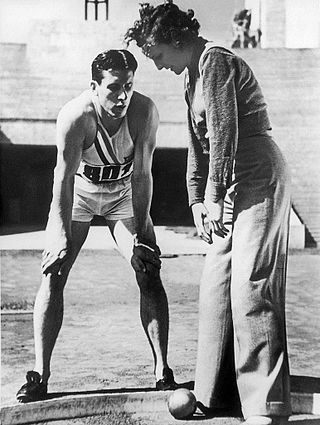
Glenn Edgar Morris was a U.S. track and field athlete. He won a gold medal in the Olympic decathlon in 1936, setting new world and Olympic records. He attended Colorado A&M — now known as Colorado State University — and played football as well as track and field. He was also an occasional actor, he portrayed Tarzan in Tarzan's Revenge.

Tag der Freiheit: Unsere Wehrmacht is the third documentary directed by Leni Riefenstahl, following Victory of Faith and Triumph of the Will. Her third film recounts the Seventh Party Rally of the Nazi Party, which occurred in Nuremberg in 1935, and focuses on the German army.
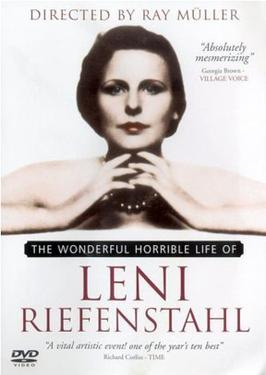
The Wonderful, Horrible Life of Leni Riefenstahl is a 1993 German documentary film about the life of German film director Leni Riefenstahl, directed by Ray Müller.

The Holy Mountain is a 1926 German mountain film directed by Arnold Fanck and starring Leni Riefenstahl, Luis Trenker and Frida Richard. It was the future filmmaker Riefenstahl's first screen appearance as an actress. Written by Arnold Fanck and Hans Schneeberger, the film is about a dancer who meets and falls in love with an engineer at his cottage in the mountains. After she gives her scarf to one of his friends, the infatuated friend mistakenly believes that she loves him. When the engineer sees her innocently comforting his friend, he mistakenly believes she is betraying him.

Impressionen unter Wasser is a documentary film released in 2002. It was directed by Leni Riefenstahl.
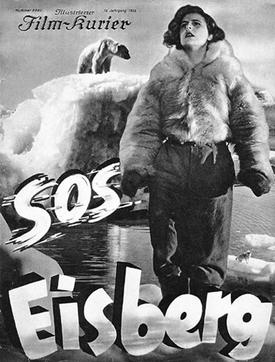
S.O.S. Eisberg is a 1933 German-US pre-Code drama film directed by Arnold Fanck and starring Gustav Diessl, Leni Riefenstahl, Sepp Rist, Gibson Gowland, Rod La Rocque, and Ernst Udet. The film was written by Tom Reed based on a story by Arnold Fanck and Friedrich Wolf. S.O.S. Eisberg follows the account of the real-life Alfred Lothar Wegener polar expedition of 1929-30. Two members of the ill-fated Wegener expedition served as technical consultants to Universal.
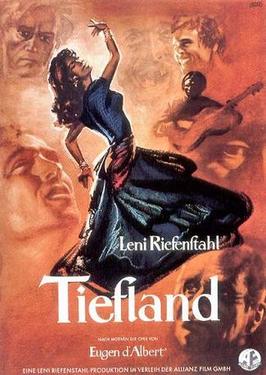
Tiefland ("Lowlands") is a 1954 West German opera drama film directed, produced, co-written, edited by and starring Leni Riefenstahl, and based on the 1903 eponymous opera composed by Eugen d'Albert to a libretto by Rudolph Lothar based on the 1896 Catalan play Terra baixa by Àngel Guimerà. The film co-stars Bernhard Minetti, and is Riefenstahl's last feature film as both director and lead actress.

Coral Gardens is the title of the 1978 English-language translation of German film director Leni Riefenstahl's Korallengärten, an illustrations book published in the same year in Germany. The book was published by HarperCollins in the United States. It is the first of two book collections of underwater photographs, followed by Impressionen unter Wasser in 1990.

The People of Kau is the title of the 1976 English-language translation of German film director Leni Riefenstahl's Die Nuba von Kau, an illustrated book, published in the same year in Germany. The book is a follow-up to her earlier successful 1973 photo book Die Nuba.

The Last of the Nuba is the English-language title of German film director Leni Riefenstahl's 1973 Die Nuba, a book of photographs, published a year later in the United States. It was an international bestseller and was followed up by the 1976 book Die Nuba von Kau. It was the subject of a famous critique by Susan Sontag in claiming that it adhered to a "fascist aesthetic".

Leni Riefenstahl's Memoiren is the 1987 autobiography of German film director Leni Riefenstahl. The book received a 1993 American release and coincided with the release of the acclaimed documentary The Wonderful, Horrible Life of Leni Riefenstahl, as well as Riefenstahl's ninetieth birthday. It was featured on the 1993 New York Times list of notable books of the year.
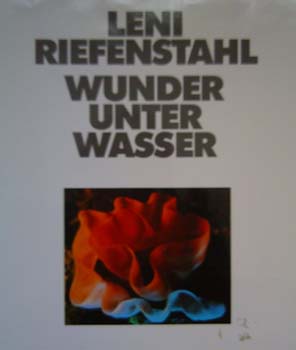
Wonders under Water is the English-language title of German film director Leni Riefenstahl's 1990 Wunder unter Wasser, an illustrations book of marine life.
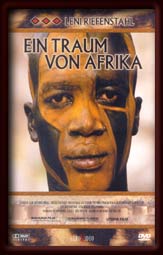
Leni Riefenstahl: Her Dream of Africa is a 2003 documentary-film by Ray Müller. The film follows Leni Riefenstahl's return to Sudan to visit the Nuba tribe whom she published photographs of in best-sellers such as The Last of the Nuba and The People of Kau. It is the second collaboration between Riefenstahl and Müller. She was the subject of his acclaimed 1993 documentary The Wonderful, Horrible Life of Leni Riefenstahl, which followed her life and reflected on her Nuba activities.

The Blue Light is a black-and-white 1932 film directed by Leni Riefenstahl and written by Béla Balázs with uncredited scripting by Carl Mayer. In Riefenstahl's film version, the witch, Junta, played by Riefenstahl, is intended to be a sympathetic character. Filming took place in the Brenta Dolomites, in Ticino, Switzerland, and Sarntal, South Tirol.
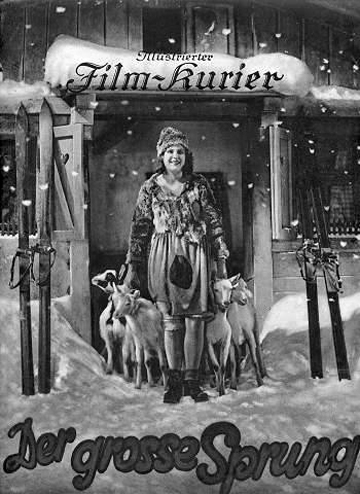
The Great Leap is a 1927 German silent comedy film directed by Arnold Fanck and starring Leni Riefenstahl, Luis Trenker and Hans Schneeberger. A young Italian girl living in the Dolomites falls in love with a member of a tourist party skiing on the nearby mountains.




















